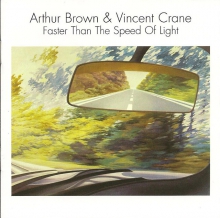MENNO VON BRUCKEN FOCK
FASTER THAN THE SPEED OF LIGHT (1996), heruitgave (E)

Arthur Brown is one of the most influential vocalists in the history of rock music. He has a very distinguished style and he is unique in his performances. With his voice he's able to whisper, shout, scream, sing like a classically trained tenor or to sing softly in a jazzy style. Ever since the late sixties with his huge hit Fire (1968), Brown has been singing, dancing and recording and still performs to date. The very talented keyboardist Vincent Crane can be considered to be ranked among other great keyboardists like Keith Emerson (Nice) and Jon Lord (ex-Deep Purple) or perhaps also Graham Field (Rare Bird, Fields). Crane was a member of The Crazy World Of Arthur Brown until Crane decided to do his own thing and founded Atomic Rooster. Like Jon Lord, Crane preferred organ and piano, and he used the other keyboards reluctantly. During one of his episodes of manic depression that led to his premature death aged 45, he was contacted by Brown, who persuaded him to go to Klaus Schulze's synthesizer school. Although Crane went there, he came out after two weeks stating that it was 'rubbish', but at least he was back on track again. Instead of using the modern technology, Crane and Brown decided to use an orchestra for their joint effort Faster Than The Speed Of Light. Members of the Frankfurt Symphony Orchestra were conducted by Crane brilliantly. With the help of a very talented drummer Clifford Venner, who would be playing with New Musik in 1982, Brown & Crane came up with some interesting compositions.
Throughout the album the main theme keeps popping up once in a while and part of the music flows continuously without interruptions. In the first track we hear a classically oriented piano played by Crane, then accompanied by the orchestra and Brown using his tenor voice. The music flows right through into Nothing We Can Do, an up-tempo song with a nice groove on which Crane is playing the organ like Emerson. Brown sings, recite and sometimes uses a distorted voice. In the slow majestic interlude you'll hear some synthesizer sounds while Brown sings beautifully and softly. The end piece is performed by piano and orchestra and as Brown joins in the next tune No, the music sounds as part three of the previous song. The main theme is explored in different ways by the orchestra in Bright Getaway and the sound is comparable to a musical in the style of Leonard Bernstein's West Side Story. The piano is the connection between these instrumental pieces. Timeship combines gently sung verses with up-tempo choruses in which Brown uses a somewhat unnatural deep voice. The orchestrations and other parts remind me of the musicals of the sixties again. The music fades away with solo piano. For the first time an interruption follows and there's a fresh start with frivolous music in Come And Join The Fun, a nice poppy tune with piano, organ, drums and orchestra. The last part reminds me of Fields a lot, but the orchestra makes the difference and the same theme as in the first part of the song is performed in a much lower tempo. The piano has the final 'word' in this track and opens the next one: Stormwind, a short instrumental piece with a major role for the orchestra and flowing right through into Storm, a nice cheerful tune, beautifully sung by Brown, although he uses his child's voice overdubbed in the choruses. Halfway the track you'll suddenly hear a slower, symphonic piece by piano and organ. When Brown joins in the music is in the vein of gospel music at first before returning to the original theme. This Is It is a separate track featuring Crane's keyboards, an early synthipop like tune. In the vein of rock meets pop, Brown uses his normal singing voice. Tightrope is an up-tempo rock tune, with some jazz-rock influences but the choruses sound like pop music. There's a organ solo from Crane that leaves no doubt whether he can play or not and Brown goes falsetto. Without interruption the piano carries on into Balance, a slower track in which Brown recites his poems. The orchestra opens the title track and Brown starts to sing as if he was performing in a musical. The up-tempo chorus features Crane's organ and piano again. In the last part the theme of the chorus is repeated a little too often for my taste and Brown explores the upper boundaries of his voice again. Indeed I think Ian Gillan (Deep Purple) must have listened to Brown when he started using his falsetto voice. For me this record sounds a bit like Fields, Rare Bird and Atomic Rooster but surely Brown's vocals, the addition of the orchestra and the absence of guitars and bass create another atmosphere. As a whole the music is much more accessible than the album Time Actor by Brown & Wahnfried, but especially when Brown uses his voice in another 'not ordinary singing' modus, I can imagine not everyone will be carried away by his shouting and screaming. Too bad though that Vincent Crane is no longer with us because I'm convinced he could have been one of the major keyboard players through the eighties & nineties as well.